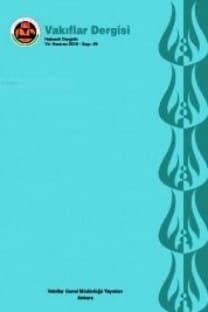Klâsik Osmanlı Sosyal-İktisadî Sistemi ve Vakıflar
Osmanlılar, devletlerine devlet-i âlıyye-i ebed müddet adını vermişlerdi. Osmanlı devleti buadı hak edercesine uzun yaşamış siyasî sistemlerden biri olmayı, oluşturduğu sosyal-iktisadîdüzen sayesinde başarmıştır. Bu düzenin idamesinde vakıfların hayatî denilecek çok önemli kat- kıları oldu. Ama Osmanlı düzeni de aynı derecede önemli katkıları ile vakıf kurumuna yepyeniboyutlar kazandırmayı başarmıştır.
Classical Ottoman Socio-Economic System and Waqfs
Ottomans called their state with the name the great state of eternity . The fact that theOttoman State was one of the long-lived political regimes and hence rightly deserving theattribution of such a title was achieved by virtue of its socio-economic system. There werevitally important contributions of the waqfs into the sustainability of such a socio-economicsystem. On the other hand, however, the Ottoman state had succeeded in implementingradically new dimensions to the waqf institutions through equally significant contributions.
___
- Başbakanlık Osmanlı Arşivi (BOA), Cevdet Belediye 7597.
- Ergin, Osman Nuri (1922). Mecelle-i Umuru-ı Belediye, İstanbul.
- Establet, Collette, Jean-Paul Pascual (1998). Les Inventaires Après Décès de Pèlerins Morts à Damas Vers 1700, Damas.
- Genç, Mehmet (2000). “İltizam”, DİA, C. 22, s. 154-158.
- Gerber, Haim (1988). Economy and Society in an Ottoman City: Bursa, 1600-1700, Jerusalem.
- Geremek, Bronislaw (1994). Poverty-A History, İngilizceye Çeviren: Agnieszka Kolakowska, Blackwel, Oxford.
- Raymond, André (1973-74). Artisans et Commerçants an Caire au XVIIIe Siècle, Şam.
- Tournefort, Joseph de (2005). Seyahatname, II. Kitap, (ed. Stefanos Yerasimos, çev. Teoman Tunç Doğan), Kitap Yay. İstanbul.
- Üçel-Aybet, Gülgün (2003). Avrupalı Seyyahların Gözünden Osmanlı Dünyası ve İnsanları (1530-1699), İletişim Yay. İstanbul.
- ISSN: 1011-7474
- Başlangıç: 2015
- Yayıncı: Mehmet Kurtoğlu
Sayıdaki Diğer Makaleler
Vakıf Kurucusu Olarak Osmanlı Esnafı (18. Yüzyıl İstanbul Örneği)
İstanbul Kilim ve Düz Dokuma Yaygılar Müzesi
Çağlayancerit Kezban Hatun Camiindeki Cicim, Zili Ve Sumak Dokumaları
Xıx. Yüzyılda Şeyh Şaban Veli Külliyesi
Bir Tarihçinin Kaleminden Osmanlı Dönemi Gördes Halıcılığı Kitabı
Aydınoğulları'ndan Osmanlı'ya Bir Batı Anadolu Kenti: Tire'nin Mekânsal Dönüşümü
Klâsik Osmanlı Sosyal-İktisadî Sistemi ve Vakıflar
Trabzon Ayasofya Camii'nin Mülkiyet Hakkı Üzerine Bir İnceleme
Yakup Emre ÇRUHLU, Osman DEMİR
Tekke Köyü Hacı Abdullah Halife Camisi Duvar Resimleri
